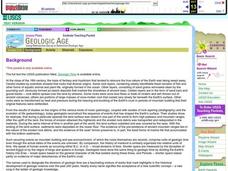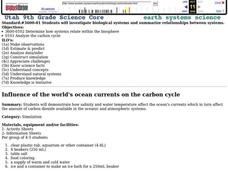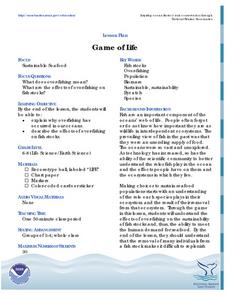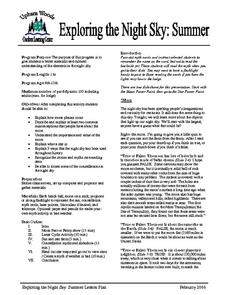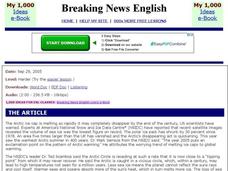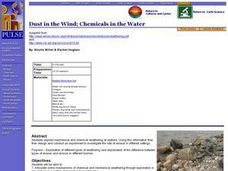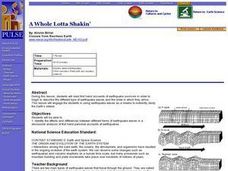Curated OER
Precipitates and Black Smokers
Young scholars discuss how hydrothermal fluid is different from seawater and what happens to it as it passes through the oceanic crust. They observe and manipulate calcuim chloride and baking soda to comprehend how precipates form.
Curated OER
VAcations in Northern California
Students explore the natural resources and National Parks of Northern California that are commonly visited by people traveling in the United States. They use maps to locate various sites, plan a highway travel route and use the internet...
Curated OER
Sea Floor Spreading
Students recreate sea-floor spreading and the pattern of magnetic stripes that are created by different configurations of plate boundaries. They see how transform faults work.
Curated OER
Coming to California
Fourth graders read excerpts from Juan Bautista de Anza's diaries. They analyze the impact of primary sources. They write journal entries for characters in stories they have read during the year.
Curated OER
Water and Land 207
Students examine maps of different projections, mathematically calculate distortions, and note the advantages and disadvantages of each map. They study the different maps and transfer the map to graph paper.
Curated OER
Discoverers and Explorers
In this discoverers and explorers worksheet, students read short paragraphs about Christopher Columbus, Magellan, Sir Francis Drake and Walter Raleigh.
Curated OER
Iron Fertilization - Pumping Iron
The theory that adding iron to ocean water may increase phytoplankton ability to remove carbon dioxide from the atmosphere is examined. The Monterey Bay Aquarium Research Institute is monitoring conditions off the California coast to...
Curated OER
Mammals of the Deep Blue
Third graders study ocean mammals. They explore various websites and databases to answer questions and record answers about whales and dolphins. Finally they use the information obtained to write a report about them.
Curated OER
Marine Ecosystems
Students identify producers and consumers and construct a food chain from four marine ecosystems. They describe the delicate balance among organisms in each environment. In groups, students discuss the human activities that upset the...
Curated OER
Let's Get Physical
Explore the benefits of physical activity and how it will affect your students' health. Students track their physical activities for one week and then compare their results. Collaboration with a math teacher woould be useful as it would...
Curated OER
Geologic Age
Students investigate radioactivity as a tool for measuring geologic time and how geologists use this information to determine the absolute age of rocks or minerals.
Curated OER
Canada, O Canada
Students study the similarities and differences between Canada and the United State in this unit. They examine geography, government and culture as they "travel" through Canada.
Curated OER
Classifying Shells
Students observe and classify different types of shells. They compare and contrast an exhibit they created with one that already exists in a musuem. They discover the different characteristics of shells.
Curated OER
Earth Systems
Ninth graders investigate biological systems. They summarize relationships between systems. Students determine how systems relate within the biosphere. They analyze the carbon cycle.
Curated OER
CO2 and Air Pollution
Seventh graders observe and test for the presence of carbon dioxide gas. They compare concentrations of carbon dioxide gas and conclude high concentrations of carbon dioxide gas are unhealthy for human beings.
Curated OER
Follow a Fish
Learners choose a fish from anywhere within the Ocean Center. They observe it for a given time, recording its behavior. Students comprehend the concept that living things have individual characteristics that enable them to live in their...
Curated OER
Ocean Life
Students explore the topics of ocean water salinity, ocean life zones, marine life classification, and ocean food chains. They observe demonstrations, conduct experiments, complete quizzes and handouts, and analyze key vocabulary.
Curated OER
Game of Life
By playing this game, students discover what happens to a fish stock when large amounts disappear.
Curated OER
Exploring the Night Sky: Summer
Students explain how moon phases occur. They describe and explain at least two common misconceptions that people have about the moon. Students explain what a star is. They explain 3 ways that the night sky has been used throughout history.
Curated OER
Mapping the Middle East
Students examine how the countries of the Middle East were created. They explore the influence of various political and geographic factors in their creation. They list the things they should consider in deciding how to draw new borders...
Curated OER
Influential Scientists Vocabulary Quiz
In this science vocabulary worksheet, students match the names of 19 science professionals with the definition. Example: Ichthyologist (studies fish).
Curated OER
Breaking News English: Global Warming
In this Global Warming worksheet, students read the article, answer true and false questions, complete synonym matching, complete phrase matching, complete a gap fill, answer short answer questions, answer discussion questions, write,...
Curated OER
Dust in the Wind; Chemicals in the Water
Students explore mechanical and chemical weathering at stations. They articulate some mechanisms of chemical and mechanical weathering through exploration in a lab. Students stations describe how chemical weathering differs from...
Curated OER
A Whole Lotta Shakin'
Students read first hand accounts of earthquake survivors in order to begin the describe the different types of earthquake waves and the order in which they arrive. They engage in using earthquake waves as a means to indirectly study the...
Other popular searches
- Math Lessons on Oceans
- Pre K Lessons on Oceans
- Prue K Lessons on Oceans
- Drama Lessons on Oceans
- Pr K Lessons on Oceans












